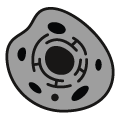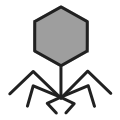Research
The research focus of the almost 100 scientists at the DSMZ are the various aspects of biodiversity in prokaryotes & eukaryotes.
Collection
In our online shop we offer the most diverse portfolio of bioresources for researchers from academia & industry.
Services
We offer a comprehensive portfolio of services like identification, characterization, specific analyses & online tools.
News
Bioresources

Bacteria
> 38,600 strains

Archaea
> 780 strains

Plant viruses
> 930 viruses

Human & Animal Cell Lines
> 950 cell lines

Plasmids
> 250 plasmids

Fungi & Yeasts
> 9,700 strains

Bacteriophages
> 1,400 phages

Cyanobacteria & Protists
> 160 bioresources
Research
BacDive
The Bacterial Diversity Metadatabase
Our metadatabase of organism-linked information covering the multifarious aspects of bacterial and archaeal biodiversity.
TYGS
Type (Strain) Genome Server
TYGS offers a truly genome-based classification and identification of prokaryotic strains without overestimating phylogenetic confidence.
LPSN
List of Prokaryotic names with Standing in Nomenclature
LPSN is a compilation of all names of Bacteria & Archaea which have been validly published according to the Bacteriological Code.
Short Tandem Repeat (STR) Profile Search
Analysis of Short Tandem Repeats
Since STR microsatellites are stable as well as highly polymorphic in human populations, STR profiling is shown to be ideal for authentication of human cell line samples.






